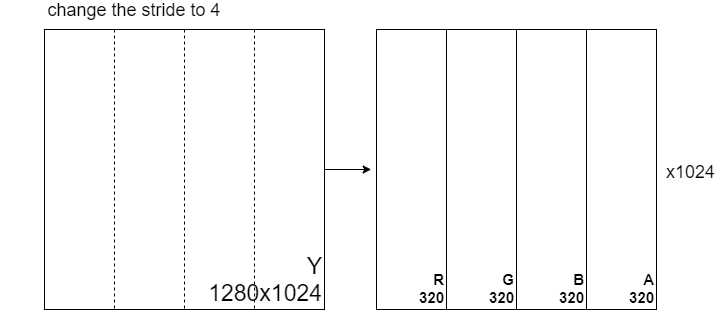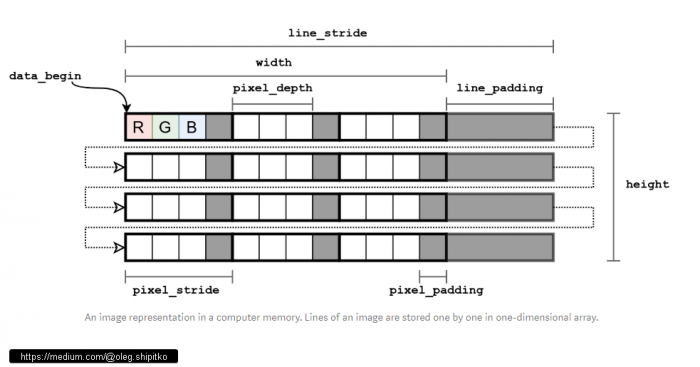Table of Contents
GRAY8 vs RTP
problem:
single plane raw formats are not part of rfc4175, and as such 2nd class citizens to gstreamer, RTSP or anywhere else.
solution:
an image format is just a convention, internally they are byte(octet) streams. we can re-package a datastream to another format, as long as we mind our strides.
view the image format as just a stream of octets. here is our stream in Y8 format
+--+--+--+--+ +--+--+--+--+
|Y1|xx|xx|xx| |Y1|xx|xx|xx| ...
+--+--+--+--+ +--+--+--+--+
and again, data quartered and represented in 8 bit depth and with stride of 4
+--+--+--+--+ +--+--+--+--+
|R0|G0|B0|A0| |R1|G1|B1|A1| ...
+--+--+--+--+ +--+--+--+--+
note the above represents two sequential pixels.
the trick is to use gstreamer built in format spec and let that handle the conventions.
the hammer

as easy as
gst-launch-1.0 -q \ videotestsrc pattern=white num-buffers=1 \ ! video/x-raw, format=GRAY8, width=4, height=4 \ ! identity dump=1 \ ! rawvideoparse format=rgba width=1 height=4 \ ! identity dump=1 \ ! fakesink 00000000 (0x7f369c00a8c0): eb eb eb eb eb eb eb eb eb eb eb eb eb eb eb eb ................ 00000000 (0x556228700560): eb eb eb eb eb eb eb eb eb eb eb eb eb eb eb eb ................
note: why white pixel is not FF=(255)?
gstreamer uses YUV colorimetry when generating a GRAY8 test image
and YUV doesnt use the entire 0-255 space. issue
note2: this example is running on linux/debian,
to adapt to windows using powershell replace \ with ` and
place quotes around video/x-raw, format=GRAY8, width=4, height=4
FakeRawPay
gray8 raw video transported as RTP payload via a “fake” rgba parsing step
conforming to RFC4157
pay
gst-launch-1.0 -v \ videotestsrc pattern=white is-live=1 \ ! video/x-raw, format=GRAY8, width=4, height=4, framerate=30/1 \ ! rawvideoparse width=1 height=4 format=rgba \ ! rtpvrawpay \ ! queue \ ! udpsink host=localhost port=5000
depay and back to gray8
gst-launch-1.0 -v \ udpsrc port=5000 \ ! "application/x-rtp, media=(string)video, clock-rate=(int)90000, encoding-name=(string)RAW, sampling=(string)RGBA, depth=(string)8, width=(string)1, height=(string)4, colorimetry=(string)SMPTE240M, payload=(int)96" \ ! rtpvrawdepay \ ! queue \ ! rawvideoparse width=4 height=4 format=gray8 \ ! videoconvert \ ! fpsdisplaysink
strides and offsets
there are caveats to this approach (yuv). get the hammer and study the design document.
pstride only exist for simple pixel formats. It represent the distance in bytes between two pixels. This value, when it exists, is constant for a specific format.
rtstride (row stride), is the size, in bytes, of one [image] line. In general, it must be larger or equal to pstride * width, when pstride exist for your format. This design document outline the calculation of the default strides and offsets [channels\planes] within the libgstvideo library. Notice the use of RU4 or RU2, which are round up, these are used to ensure the each row starts on an align pointer. This simplify memory access in software processing.
When you use VAAPI, you are using some HW accelerators. These accelerators have wider memory alignment requirement, hence the end results is that strides will be larger, and sometimes there will also be couple of padding rows. question
GRAY8
8-bit grayscale “Y800” same as “GRAY8”
| Component | color | depth | pstride | offset | rstride | size |
|---|---|---|---|---|---|---|
| 0 | Y | 8 | 1 | 0 | width | rstride*height |
+--+--+--+--+ +--+--+--+--+ |Y0|x |x |x | |Y1|x |x |x | ... (two pixel representation, in octet)) +--+--+--+--+ +--+--+--+--+
RGBA
rgb with alpha channel last (big-endian)
| Component | color | depth | pstride | offset | rtsride | size |
|---|---|---|---|---|---|---|
| 0 | R | 8 | 4 | 0 | width*4 | rstride * height |
| 1 | G | 8 | 4 | 1 | ||
| 2 | B | 8 | 4 | 2 | ||
| 3 | A | 8 | 4 | 3 |
+--+--+--+--+ +--+--+--+--+ |R0|G0|B0|A0| |R1|G1|B1|A1| ...(two pixel representation, in octet) +--+--+--+--+ +--+--+--+--+
fourcc on linux
MSDN on stride
